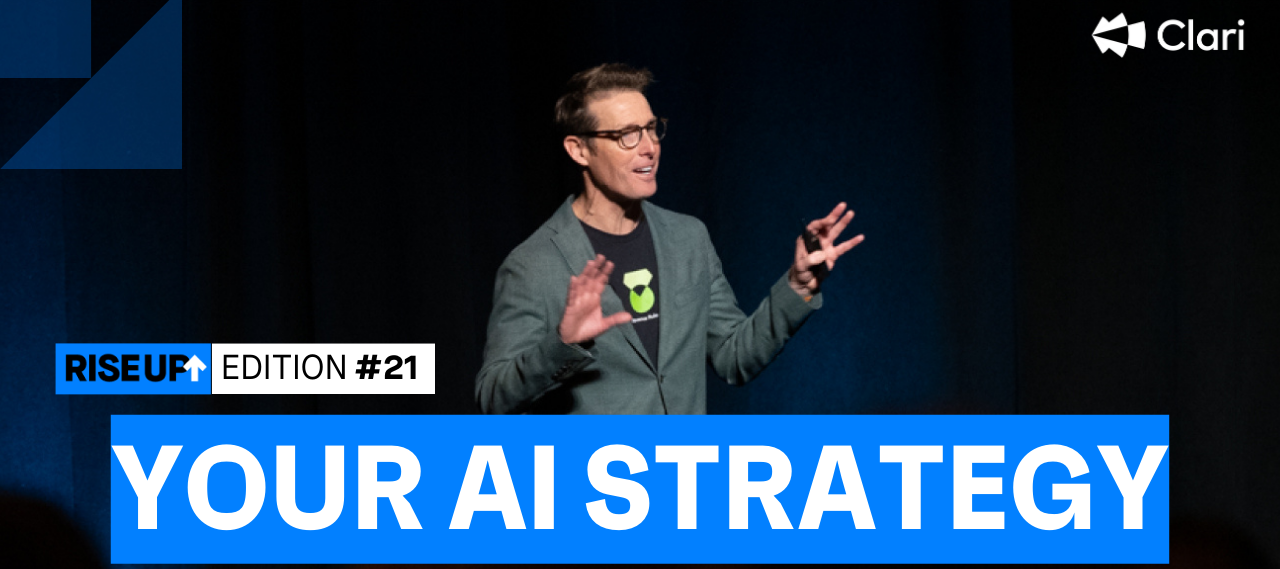Every leader I know is thinking about AI.
We’re living through a transformative time in business. And AI adoption could be the difference between surging ahead of competitors or fading into obscurity.
That’s why strategy is so important. AI may be the most powerful tool your company can use to transform your revenue process. But it’s accompanied by legitimate concerns and technical hurdles. Balance is key.
How are you thinking about AI strategy?
Here are three guiding principles to help you tackle tough AI questions and build a legendary career in revenue.
Principle #1 - Companies will win with proprietary data and workflow integration
The base AI model is now a commodity.
With the widespread availability of AI, simple adoption is no longer enough. Every one of your competitors has access to base models — and sooner or later they’ll figure out how to maximize their use.
So, how do you win in the market?
Teams who want to reinvent the revenue process and deliver breakthrough results need to focus on AI integration that can’t be easily copied.
There are two standout ways to dig a strategic moat.
First, you can build proprietary data within your organization. Data only you have access to. This data powers your AI models and provides next-level insights, analytics, and generative outputs.
Second, you can integrate proprietary data into your revenue-facing workflows. Make your team more informed and more productive across everything from forecasting and lead scoring to pricing and outreach.
Together, these two strategic pillars can help you make the most of your AI resources.
Principle #2 - You don’t need to be an AI expert, but you need to be thoughtful
AI is complex and it’s advancing at a blistering pace.
As I mentioned in last week’s newsletter, revenue pros should be aware of the three main types of AI — predictive, descriptive, and generative. Each one serves a unique purpose and can help you solve emerging revenue problems.
But you don’t need to be an AI expert.
Instead, rely on your trusted technology partners for their expertise. Consult with your CTO. Connect with your AI practitioners. Create a collaborative dynamic to drive key business objectives.
This approach frees you to drive key revenue outcomes while your technology partners contribute their knowledge and expertise.
Remember: An AI strategy requires all partners to move in the same direction.
Principle #3 - The key is balancing human intelligence and AI
AI has the power to unlock human potential, not replace it.
Consider one of the most painful statistics about the average sales rep — the amount of time they actually spend selling. Salesforce research estimates it at less than 30%.
AI is positioned to fundamentally change this dynamic.
We’ve all seen, for example, the monotonous and time-consuming task of updating CRM records. By offloading this task to AI, reps can take back several hours each week – hours they can use to cultivate prospects. AI can also summarize sales reps’ calls, craft their follow-up emails, and suggest nurture campaigns.
Think of AI as the Chief of Staff, conducting analysis, delivering insights, taking action, and
suggesting next steps, all at superhuman scale.
As a revenue leader, our role is twofold: first, to unlock human potential through the strategic use of AI. And second, to identify the most high-impact way to utilize this newfound capacity.
How are you balancing human intelligence and AI?
The future of revenue is bright.
And you have a role in building it.
As you’re laying down your AI strategy, be sure to keep these principles in mind.
- Companies will win with proprietary data and workflow integration.
- You don’t need to be an AI expert, but you need to be thoughtful.
- The key is balancing human intelligence and AI.
Nail these three parts of AI integration and you’ll be well on your way to a winning strategy and a legendary career in revenue.
‘Til next time,
Andy Byrne
CEO, Clari




